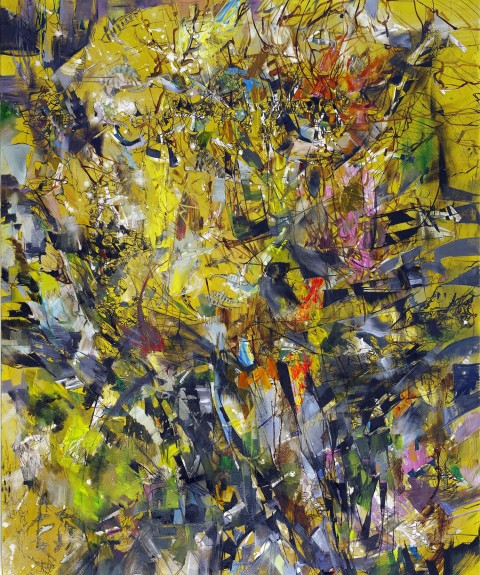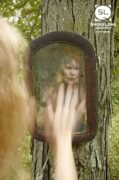My father creeps down the hall in his lobster costume, big red tail ssss-ing as it drags across the carpet. It’s been this way since my mother left two Junes ago, piling her things into the back of a cab, headed for Hollywood or Vegas, somewhere bright and impatient.
“I never did get to do the exciting things,” she said, tying a pink kerchief around her crepe-skinned neck. She squeezed me to her chest like I was sending her off, blew a thespian kiss to my father, a cruise-ship sayonara. We stood in the yard after the taillights disappeared, thinking maybe she didn’t mean this. Thinking, how could we go inside, how could we make this real? My father tucked himself away behind the locked door of their bedroom for a week and I left plates of food that only attracted ants.
I was in the kitchen early the morning he came through the door carrying the monstrous plush lobster suit like a child from a burning building. He smelled of dumpster and spilled scotch.
“Look here, look here, tossed on the side of I-90, what a treasure, yes?” he said, eyes blitzing, and it was the first time I’d seen his face for a cold week so “yes,” I said, a treasure. He hoisted the suit in both arms and disappeared, and I imagined my mother as a tiny canary, black velvet hiding her from a world of light.
Soon he started wearing the suit for every meal. He’d scoop forkfuls of shepherd’s pie through the little breathing hole, spoons of butterscotch pudding. Then it was while he watched soaps in the afternoons. Then it was always.
I came into the living room one evening, a home video muted on the TV, every curtain drawn, my father rocking his knees to his chest. On the screen, my mother had her back to the camera and she was swinging my three-year-old body in her arms, dipping me like a tea kettle as I laughed. She put me down and I toppled past the camera, out of view. Inside his lobster shell, my father leaned toward the screen, a grandiose shadow cast on every wall. We both waited for my mother to turn around, waited and waited until the video cut to a recording of the Macy’s Day Parade.
Her belongings started to go missing. I bought pistachios and her hummingbird nutcracker was nowhere to be found. Then her Sonny and Cher memorabilia plate was gone from the kitchen wall, her knitting needles pulled from a ball of powder pink yarn. When I grew too curious, I crept into his room while he napped on the couch, half-expecting a shrine of her things or a mound to curl up against. But nothing. Even her jewelry box was wiped clean.
That night, I made his favorite brand of frozen lasagna and planned to ask about the disappearances. When my father got up from the table to wipe lasagna off his claw, a pearl earring dropped from the nostril of the crustaceous getup.
“Mom’s?” I asked. He bent to pinch it up and looked at me from somewhere inside that dark hole before he tottered toward the hall.
Tonight, I listen to him lug past my bedroom door. It’s late, but I hear him turn the coffee pot on. Too many times he dumped scalding coffee through the breathing hole and down the inside of his shell before he started using a turkey baster to suck it from the pot and squeeze it into his mouth.
In the living room, a pincer clicks the record player on, moving the arm into place on my mother’s favorite violin concerto. This is new. I move to the doorway and in the flicker of a dying bulb I see my father waltzing, claws raised, holding the air in the shape of my mother, pulling her close, dipping and twirling and spinning together on the wool rug.
“Dad.” I step into the light and he turns, the black hole where his face must be reaches straight through me. “Isn’t it time?” I ask. His claws are still raised. I cross the room and when we’re face to face I reach for him, lifting the suit up and over his head. Coffee dribbles have dried on his chin and he stares at me through teary eyes, worlds and worlds away. I slide the suit down over my own body.
Inside, a galaxy of my mother, glittering bracelets, balls of yarn that smell of her perfume, nail clippers with crescent clippings still between the teeth, a wad of hair woven into her comb, a toothpick smudged with lipstick, the nutcracker. My mother dangles and dances on the walls of this shell home, nestled into the structure’s frame, whispering into my ear as the concerto rolls. I see my father’s face through the hole in the suit. He wraps his arms around me and we sway and sway.

Notes from Guest Reader Christopher Santantasio
Rachel Reeher’s story ‘Lobster’ is a gem: glittering, sharp, precisely faceted. Each time I read it, I’m struck by the power of the voice, the subtle detail work, the unforgettable final image. There is no road map for navigating grief, and Reeher’s rendering of this truth is tender, unflinching, and magnificently weird. ‘Lobster’ takes hold from the very first sentence and doesn’t let go. Best of luck escaping its grip.


 The core workshop of SmokeLong Fitness is all in writing, so you can take part from anywhere at anytime. We are excited about creating a supportive, consistent and structured environment for flash writers to work on their craft in a community. We are thrilled and proud to say that our workshop participants have won, placed, or been listed in every major flash competition. Community works.
The core workshop of SmokeLong Fitness is all in writing, so you can take part from anywhere at anytime. We are excited about creating a supportive, consistent and structured environment for flash writers to work on their craft in a community. We are thrilled and proud to say that our workshop participants have won, placed, or been listed in every major flash competition. Community works.